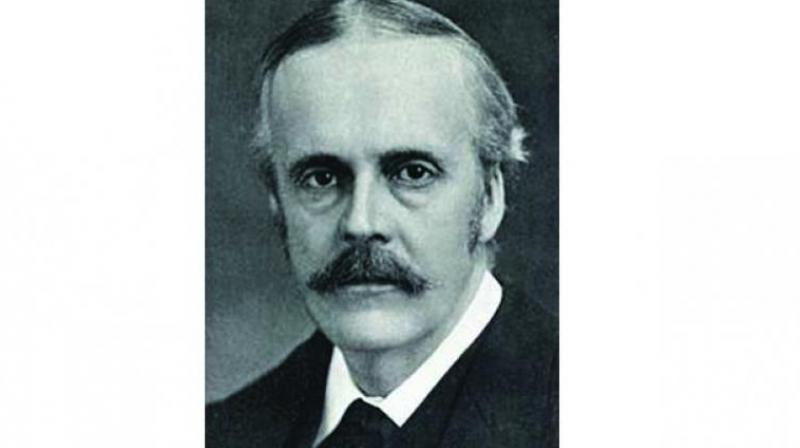Why celebrate the Balfour Declaration?

My favourite summation of the origins of the Palestinian-Israeli dispute can be found in a poem — not by a justifiably renowned resident of, or refugee from, the territories, such as Mahmoud Darwish or Mu’in Bseiso, but by a Briton of European Jewish descent.
Usefully, Michael Rosen’s verses are compact enough to be cited in full. I’m sure I’ve cited them before, but they are worth repeating in the context of the upcoming centenary of the Balfour Declaration of Nov 2: “A family arrived and said that they had papers/ to prove that his house was theirs./ “No, no,” said the man, my people have always lived here./ My father, grandfather … and look in the garden,/ my great-grandfather planted that.”/ “No, no,” said the family, look at the documents.”/ There was a stack of them./ “Where do I start?” said the man./ “No need to read the beginning,” they said./ “Turn to the page marked ‘Promised Land’.”/ “Are they legal?” he said. “Who wrote them?”/ “God,” they said. “God wrote them, look/ here come his tanks.”
It’s possible to make the argument, though, that British imperialism trumps the Old Testament in reviving the concept of the Promised Land in the 20th century, specifically via the Balfour Declaration of Nov 2, 1917, whereby, in the throes of the First World War, it was announced that “His Majesty’s government view with favour the establishment in Palestine of a national home for the Jewish people, and will use their best endeavours to facilitate the achievement of this object.…”
The vow was made in a letter from Arthur Balfour, a former prime minister who was at that point foreign secretary in the government of David Lloyd George, to Walter Rothschild, a prominent British backer of the Zionist cause. The only Jewish member of the British cabinet at the time, Edwin Montagu, considered the document anti-Semitic, fearing that it would provide an excuse for the expulsion of Jews from European countries. He also feared that it could lead to “a population in Palestine driving out its present inhabitants”.
The Zionist movement, headquartered in Berlin, attracted the support of only a small minority of European Jews at the time. Ultimately, it was the unequivocally dreadful Nazi-led Judeocide two decades later that decisively transformed perceptions. Even in the early 20th century, however, there were recurrent concerns over the potential consequences of Zionist success. As Ian Black, the newspaper’s former Middle East editor, notes in a recent extended article in The Guardian, an Arab writer called Abdullah Mukhlis worried as early as 1910 that “the new settler will expel the indigenous and we will have to leave our country en masse”, presciently adding: “Palestine may be endangered. In a few decades it might witness a struggle for survival.”
That struggle, reinvigorated 50 years ago by the aftermath of the Six-Day War, goes on — and the prospects for its success don’t look much better today. Next week, to mark the centenary of the declaration, Lord Balfour and Lord Rothschild — not the original culprits, obviously, but their titled heirs — will host a celebratory event in London at which Prime Ministers Benjamin Netanyahu and Theresa May will be chief guests. To his credit, British Opposition leader Jeremy Corbyn reportedly turned down the invitation to come and dance on the graves of countless thousands of innocents. Sure, the Balfour Declaration also sought to make it clear “that nothing shall be done which may prejudice the civil and religious rights” — no mention of political rights, mind you — “of existing non-Jewish communities in Palestine, or the rights and political status enjoyed by Jews in any other country”. That helps to explain why more than one organisation in Britain today is focusing on the “unfulfilled promise” of the Balfour Declaration.
At the same time, there are those who argue that the declaration was not particularly consequential, given that following British colonisation once the remnants of the Ottoman Empire had been defeated in 1918, London became more ambivalent about the Zionist project, denying European Jews refuge in Palestine when they most needed it in the run-up to the Second World War. Back in 1947, it may just about have been possible, partially by ignoring the t of Palestine’s population in 1917 - to envisage Israel as a potential socialist bulwark in the Middle East. Today, it is not just Theresa May and Donald Trump but many ideological heirs, across Europe and in the US, of the Nazis that dreamed up the nightmare of the Final Solution, who view Mr Netanyahu’s Likudite administration as an exemplar of ethnic exclusivity based on notions of racial superiority. We cannot know how events in the Middle East would have unfolded without the Balfour Declaration, but celebrating its centenary is undoubtedly grotesque.
By arrangement with the Dawn

